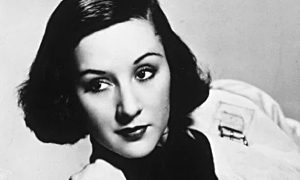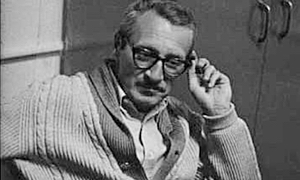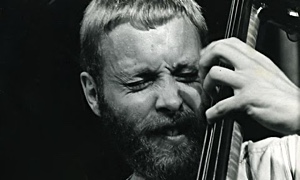Home » Jazz Articles » First Time I Saw » Jimmy Rowles
Jimmy Rowles
Part 1
I had just finished my night's work at a long-since vanished jazz club in Greenwich Village called Hopper's. I was singing with The New York Jazz Quartet: Sir Roland Hanna & Carrie Smith, George Mraz, Richie Pratt, and Frank Wess. The year was 1977. Mraz said he was going to walk over to Bradley's* to listen to the legendary jazz pianist Jimmy Rowles, and invited me along. I was very eager to hear the great California musician who had played for Ella Fitzgerald, Sarah Vaughan, Carmen McRae and Billie Holiday.Bradley Cunningham provided his pianists a really god-awful little upright piano and just enough space for it and a bassist in a small corner of his long, narrow bar. Eventually, this situation was remedied when Paul Desmond's beautiful Baldwin was bequeathed to the club in his will. However, this had not occured when I first heard Rowles. He was bravely, even lovingly caressing the keys of that tinny, tiny piano, oblivious to the sounds of loud conversation at the bar, just a couple of feet away. My memory tells me the marvelous bassist Sam Jones was probably playing with him at the time.
The newspaper reviews of my work with The New York Jazz Quartet had been very favorable, so Bradley suggested I sit in with Jimmy... "Won't you favor us with a rendition"? I declined with the quite logical, correct argument that this was Jimmy's gig, I had come to relax and enjoy his music, and wouldn't think of intruding. This little game persisted during the remaining nights of my gig at Hopper's because I went directly to Bradley's each night after work. I had joined the ranks of the thousands who understood and appreciated Jimmy's unique improvisations and feather-light technique. On my last night in New York (I lived in North Carolina at the time), I decided to allow myself the pleasure of sitting in, but only after the master musician himself invited me.
I stood beside Jimmy, whispered "My Ship—A Flat," and he began a gentle and beautiful introduction. I probably sang one chorus, gave the top of the second chorus to Jimmy and came back at the bridge, the usual MO. I don't recall if I sang another tune... most likely did, but I had experienced the magic of singing with and being enchanted by Jimmy's chords and placements, his intelligent and sensitive choices adding the perfect, subtle embellishment. If there's a way to describe it, I can only say I felt cleansed.
Jimmy Rowles and I had quickly become friends in the days following our first meeting, and often talked on the telephone between New York and Raleigh. I arranged to meet Jimmy when I was in the city to prepare travel documents for my first tour of Japan with the NYJQ. We had long conversations about music and how much he missed his family and his friends in Los Angeles. Jimmy was a very social man, and because he drank to excess, he often struck up conversations with others at the bar du jour, regaling them with his curious and always hilarious drawings scrawled on cocktail napkins. In spite of the warning signs that the drinking was a serious problem, I found myself drawn to this charmer because of his music and his humor and his all-consuming humanity. In the spring of 1978, we took an apartment in Greenwich Village not far from Bradley's, and bought a sofa-bed "in case Zoot ever needs to stay in town one night."
After almost twenty years as accompaniest to Ella Fitzgerald, Tommy Flanagan decided to pursue his own career, and Jimmy received a call from Norman Granz asking if he'd be interested in the job. Jimmy was a bit reluctant at first, but he very much loved Ella, the money was right and the work steady, so the deal was made. Often when we were on tour with the great lady, it seemed either Red Mitchell or Dave Frishberg needed a place to stay. They were of course welcome to use our place, which had a small electric piano for writing, lots of books, a comfortable bed, easy access to the clubs in the Village, and just the two cats to feed. Just prior to one of our trips, we left behind a pair of crutches which had helped my once sprained ankle. Frishberg found them in the hall with a note from Jimmy: "Just back from Lourdes."
Part 2
Jimmy Rowles was possessed of a renowned sense of humor, a dedication to jazz unchallenged, and a voice best described as the sound of nails rattling in a tin can. (Think Miles with laryngitis). He was working at Bradley's, a popular bar in the Village where one might regularly hear some of the great jazz pianists. A friend came in late one night, accompanied by the famous operatic tenor, Placido Domingo. Jimmy was suitably impressed meeting the celebrated man, repeatedly addressed him as "Pablo," and asked him if he wanted to sit in! Domingo declined, but as a result of this remarkable encounter, the superb tenor arranged two complimentary tickets for his next sold-out performance at the Metropolitan Opera.It was a miserable, cold, rainy night in January as we made our way in a cab from the Village to Lincoln Center, Jimmy grumbling the whole time that he hoped to find the bar as soon as we arrived. I told him there were two bars, situated directly beneath beautiful, massive Chagall tapestries in the main lobby of the Met. Our seats were two on the aisle, and the great, acoustically flawless house was filled to capacity: about 3,000 seats. Jimmy, looking every inch the image of the hip musician of the 1950's (beret, shades, goatee), settled himself in the seat nearest the aisle, the easier to escape. The house lights dimmed, the crowd hushed and the orchestra began the overture. Suddenly, the only sound in that immense space was a solo clarinet. Not realizing opera lovers throughout the entire theater would hear him, Mr. Dulcet Tones turned to me and said, with considerable enthusiasm, "The clarinetist's a bitch!" Rattled programs, uncomfortable squirms and many shshhhsshs. Jimmy never made it to the end of the first act; he was off to admire the Chagall's after the first scene.
There is a charming PS to this story: We went backstage after the final curtain to thank Maestro Domingo. He emerged from his dressing room towelling off, a tall, substantial man in a red brocade dressing gown. He embraced Jimmy warmly and said "Jeemie! Now you know where Jazz comes from!"
Tags
First Time I Saw
Jimmy Rowles
Carol Sloane
Sir Roland Hanna
George Mraz
Richie Pratt
Frank Wess
Ella Fitzgerald
Sarah Vaughan
Carmen McRae
Billie Holiday
Paul Desmond
Sam Jones
Tommy Flanagan
Red Mitchell
Dave Frishberg
PREVIOUS / NEXT
Support All About Jazz
 All About Jazz has been a pillar of jazz since 1995, championing it as an art form and, more importantly, supporting the musicians who make it. Our enduring commitment has made "AAJ" one of the most culturally important websites of its kind, read by hundreds of thousands of fans, musicians and industry figures every month.
All About Jazz has been a pillar of jazz since 1995, championing it as an art form and, more importantly, supporting the musicians who make it. Our enduring commitment has made "AAJ" one of the most culturally important websites of its kind, read by hundreds of thousands of fans, musicians and industry figures every month.
























